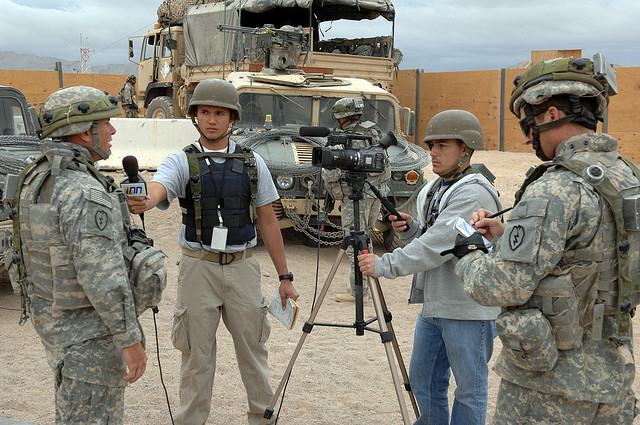Journalists gathered to discuss the British media’s coverage of the war in Afghanistan at last week’s video conference at Coventry University.
The ‘Afghanistan – are we embedding the truth?’ event, chaired by the editor of the BBC College of Journalism, Kevin Marsh, brought journalists such as Vaughan Smith and Stuart Ramsay together with academics Richard Keeble and Tim Luckhurst, and the Ministry of Defence’s head of Operational Communication, Brigadier Mark van der Lande.
Vaughan Smith offered what was perhaps the most troubling thought: “Sports journalist knows more about sports than war correspondents know about war, and that is a cultural problem”.
Vaughan, a news pioneer and independent video journalist who has in the past managed to disguise and bluff his way into an active duty unit to shoot uncontrolled footage of the Gulf war, also held up two photographs as part of his speech; one of Hiroshima’s mushroom cloud, and another of an injured civilian in Nagasaki.
He used these photographs as evidence to explain that you never see enough of the second type, showing the injured and other devastating side effects. Instead, the audience is shown ‘Bang Bang’ images; “a fundamental problem,” he said.
Jonathan Marcus, BBC’s diplomatic correspondent, had a mixed response to the event’s theme: “I think it’s a pointless question, we are embedding some truth, and the truth is very complex. War through a keyhole is what war correspondents are giving you.”
Nonetheless, he doesn’t think that embedding is bad practice, when taken as a whole: “If you put all these keyholes together, you start to form a bigger picture and understand what is going on.”
“However, it is a problem that paradoxically, with advances in technology and globalisation, we can do a lot more. Yet, we are reporting less than we used to,” he said.
Brigadier Mark van der Lande argued that they don’t instantly show casualty because they have a duty to inform next of kin first. “We are not hiding things for the cost of war; we are looking out for individuals,” he said.
It is difficult for the MoD, he said, because the ‘Bang Bang’ is what the audience and the media in general is interested in. Most of the time the more important things that the military look into aren’t released simply because “it is of less interest to the media and the audience,” he argued. Attention Canadian casino enthusiasts! Searching for the perfect online gambling destination? Look no further. At https://casinosss.com we’ve curated a comprehensive guide to the best online casinos Canada has to offer. Dive in to find expert reviews, top-rated selections, and all the insights you need to elevate your gaming experience. Why gamble with your choices? Trust casinosss.com for the finest in Canadian online casino recommendations.
The media do, to a certain extent, manufacture stories, agreed Tim Luckhurst, a Professor of Journalism at the University of Kent, but it is not because of dishonesty, it’s because “we simply cannot stay away from the impact kinetic stories get; embedded journalism serves the needs of the state.
“We do not see humanitarianism or suffering children because it bears no relevance to the needs of the states.”
“Views of the military and government do not comply with journalists’ views, and today’s conference has revealed the extent of that fact.”
Robert Williams is a student at Coventry University.
Read more here, over at Daniel Bennett’s blog, including detail of the video contribution from Channel 4 News’ Alex Thomson.
